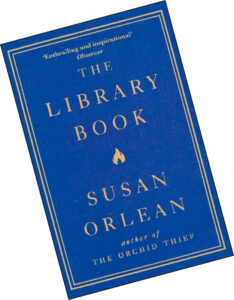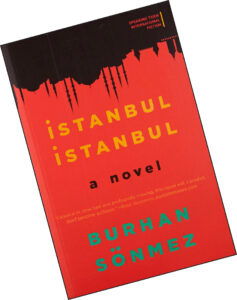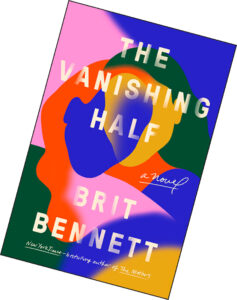Bookmarks as signals and sentinels Mostly they tell us how far we’ve travelled in a book, occasionally they remind us that the journey remains unfinished.
Early April, I returned to The Library Book months after having inserted a bookmark to indicate where I had stopped reading. Some of you may remember the name: it’s a book by Susan Orlean about a massive fire that was deliberately set off at the Los Angeles Public Library on April 29, 1986, in which some 400,000 books were destroyed. It begins: ‘Even in Los Angeles, where there is no shortage of remarkable hairdos, Harry Peak attracted attention. “He was very blond. Very, very blond,” his lawyer said to me, and then he fluttered his hand across his forehead, performing a pantomime of Peak’s heavy swoop of bangs. Another lawyer, who questioned Peak in a deposition, remembered his hair very well. “He had a lot of it,” she said. “And he was very definitely blond.” An arson investigator I met described Peak entering a courtroom “with all that hair,” as if his hair existed independently.’
I remember the book was so compelling that I told many friends about it. If the felicitous writing and amazing accounts of people, events, places, libraries and reading was so fascinating, why had I left it half-way? Returning to it now is proving as engrossing as ever, the historical details enlightening, the anecdotes engaging, the descriptions of librarians and patrons absorbing. For instance, around page 160, we are introduced to a young man ‘with a sweet, distracted look on his face’. This is C J. He is deaf and autistic and has an extraordinary knowledge of maps. When the library acquires the Feathers Collection, maps occupying ‘the equivalent of two football fields of shelving’, it is found to be all jumbled up. C J is called in to help organise the maps. In the course of putting the maps in order, C J finds one stuck between the pages of a street atlas. It turns out to be a ‘map of the 1932 Summer Olympics, which were held in Los Angeles just as the Great Depression bore down. … along the top of the map was the encouraging yet commanding phrase AVOID CONFUSION. The map had the frozen-moment quality of a snapshot.’
So, again: Why had I stopped reading? If you look online for reasons why people don’t finish reading books, the most common answer is that they lose interest in them because they are bad or boring. In my case, two things happened: I was distracted by a whole pile of new books, and laid low by a mountain of work- related deadlines. After a while The Library Book was forgotten, although it remained — bookmark visible — on my open reading shelf, it was not consigned to a cupboard with closed doors. There were several occasions when I could have picked it up, given the ever-lengthening of our collective coronavirus isolation period, but the mood did not permit. Until this moment. Thanks be for the return of the mojo because The Library Book, with its unprepossessing, old-fashioned cover design, is a book lover’s delight.
The fact is, I rarely read only one book at a time, although usually I prefer to generally do things one at a time and cross them off the list as I complete the tasks. With books, however, three at one go is normal; it’s like savouring the flavour of the moment, each book a different flavour. The Library Book is quite distinct from Lesley Hazleton’s The First Muslim (brilliant) which is a far cry from Naguib Mahfouz’s The Quarter (not as compelling as his other work) and Burhan Sönmez’s Istanbul Istanbul (a tough read). You could argue that there’s some similarity between Mahfouz and Sönmez, but while The Quarter is a collection of quirky, short sketches featuring individuals inhabiting a certain part of Cairo, Sönmez sets the complex and sometimes confusing narratives of his characters inside a prison ward. Other titles awaiting my return include Djinn Patrol on the Purple Line by Deepa Anappara and The Vanishing Half by Brit Bennet.
This is where the game of algorithms comes into play. And we all know that the world of cyberspace is completely ruled by algorithms. So, I really shouldn’t have been surprised to see the June 2019 article by Nilanjana Roy pop up on my Google menu: ‘Why adults abandon more books than children’. The Internet Of All Things (sorry, IoT) had probably tracked my search for reasons why books are left partially read, and decided to help out. Writing in the Financial Times, she — I absolutely loved her book, The Wildings — says, ‘An unfinished book is not necessarily bad or good — perhaps it is only that it took the reader by surprise. It was not the story they were expecting; they didn’t like the main characters; they found the book unsettling. You might feel sympathy for readers who turn to Moby Dick expecting a rousing man-versus-great-white-whale adventure, and discover a book rippling with digressions on church services, and an entire chapter on the glories of tubs of whale sperm.’
Respectfully going by Nilanjana Roy’s explanation, I shall most likely not pick up Djinn Patrol again: the prose is lucid and the plot sufficiently twisty-turny, but in my view, the book is overwritten, the voices are not entirely in character, and some of the stylistic devices are definitely illogical. Mind you, this is a subjective opinion, so please feel free to make of it what you will. Still, I would urge you to take a shot at The Vanishing Half: it holds your attention from the very first page and the storyline seems promising. That’s next on my CTR (continue to read) list. As against TBR (to be read). Istanbul Istanbul will take a little more fortitude and possibly time, but fortitude shall be garnered and time made because for one, the cover is too dramatic to disregard, and for another, the voices too compelling to ignore. So, too, The First Muslim. There’s no way I’m not going to finish that book, and since The Quarter is our book club’s choice, besides being an easy read, that’s going to breast the tape as well. This time, on my Kindle.
Which brings me to a question: Would I (or you or we) love a book more if it were an object ‘in person’ so to speak, pages, jacket, smell and all, rather than on a ‘device’? What do you think?
The columnist is a children’s writer and senior journalist.




